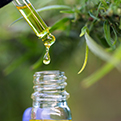
Tinnakorn Jorruang / Getty Images
Nonintoxicating cannabinoid cannabidiol (CBD) has caught the public eye as a natural remedy for various medical conditions. Consequently, unregulated CBD products that contain unknown, trace quantities of D9-tetrahydrocannabinol (THC) have proliferated, creating new challenges for labs that conduct drug testing.
In the latest issue of Clinical & Forensic Toxicology News (CFTN), Gregory Janis explains how impure CBD products containing trace amounts of THC can yield positive urine drug test results, and the struggles labs face in identifying CBD. Until CBD is regulated, assuring the purity of CBD products, “there is the potential for misleading urine drug testing results stemming from long-term CBD use,” said Janis, associate vice president of research and development and mass spectrometry co-discipline director at Laboratory Corporation of America.
CFTN is a quarterly AACC/College of American Pathologists (CAP) educational newsletter for toxicology laboratories and individuals with an interest in toxicology. Each issue highlights topics of interest to the clinical and forensic toxicology fields.
The quality of most CBD products is highly variable, explained Janis. Some contain a small amount of THC coextracted from the hemp plant along with CBD. “The THC amount is too small to get a CBD user high, but with prolonged use of CBD products, the THC level (or metabolite level) may bioaccumulate and reach concentration capable of appearing as a positive result on a urine drug test. Thus, a long-term user of low-quality CBD could appear as a marijuana user when in fact they are not,” Janis told CLN Stat.
CBD products are widely available throughout the United States, found in tobacco shops, health and beauty shops, grocery stores, and pet stores. The Drug Enforcement Administration (DEA), however, considers CBD as a schedule 1 drug with no legitimate use. “This is the same scheduling as heroin and LSD. However I know of no evidence that the DEA has attempted to enforce this,” said Janis.
<p">The epileptic drug Epidiolex is the only CBD formulation approved by the U.S. Food and Drug Administration (FDA), which considers all other CBDs as pharmaceutical products that cannot be present in any nonapproved formulation. FDA does not allow the sale of pharmaceuticals within any food, beverage, or nutritional supplement without data from controlled clinical trials that demonstrate their safety and efficacy. With the exception of Epidiolex, no studies have been submitted to the FDA for review. “Thus, it is within the authority of the FDA to disallow the sale of all over-the-counter CBD. In some localities, this has been done, and foods containing CBD have been pulled from shelves,” said Janis. The FDA has also pursued CBD manufacturers that make health claims about their CBD products.
</p">
The 2018 farm bill, which legalized the production of hemp, is often seen as protecting CBD. “It does not actually regulate CBD. It regulates hemp and differentiates hemp from marijuana. Nothing else,” clarified Janis.
In his view, regulating CBD products to contain no detectable THC is the only way to resolve the drug urine test problem.
CFTN is an educational service of the Forensic Urine Drug Testing Accreditation Program co-sponsored by AACC and CAP. Individual subscriptions are also available; the regular price is $65, and AACC members pay $45. Subscribers are eligible to receive four ACCENT continuing education credits per year, one credit per quarterly issue.